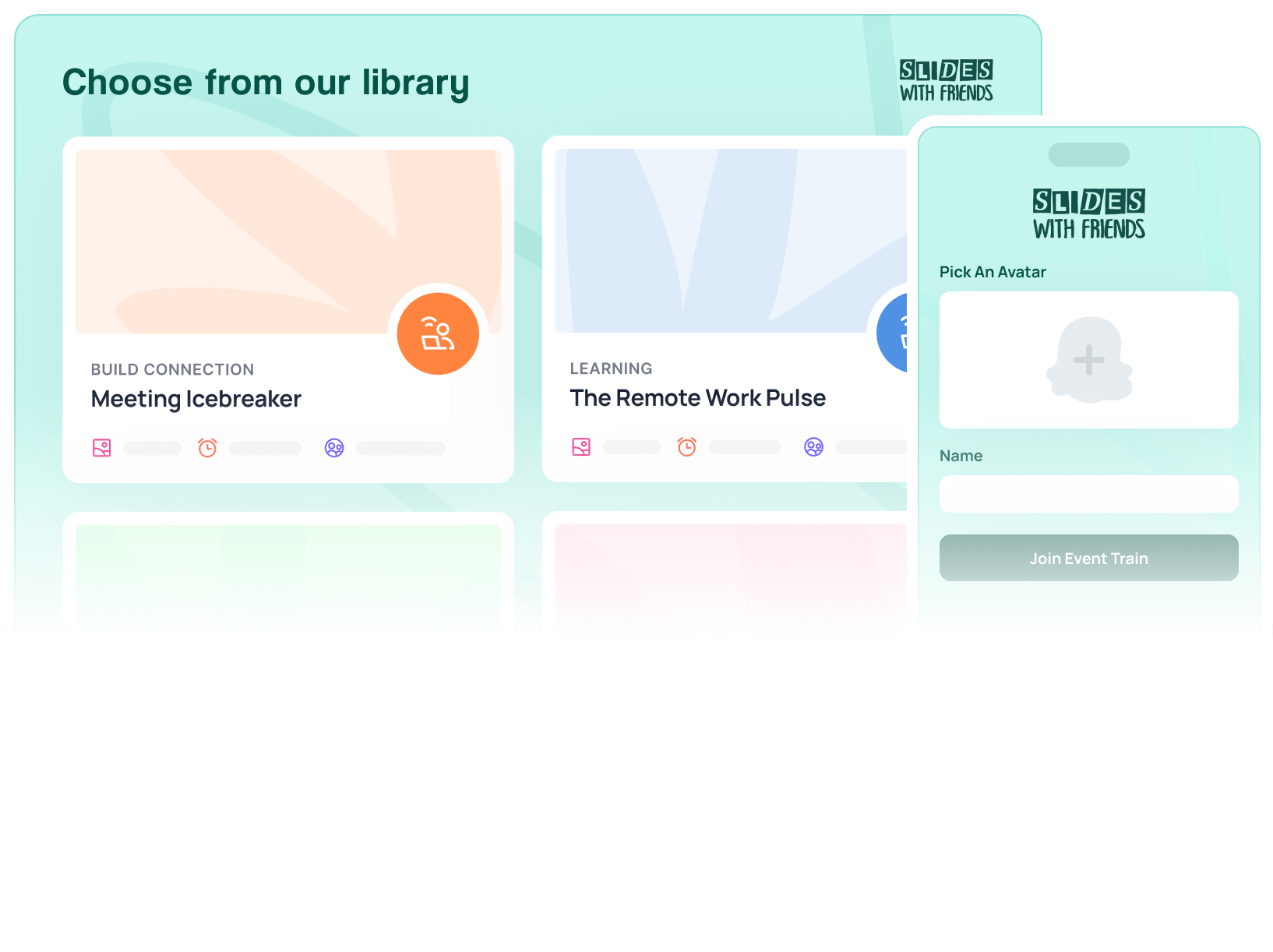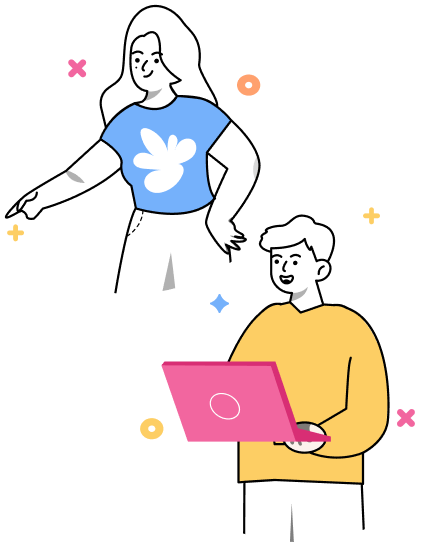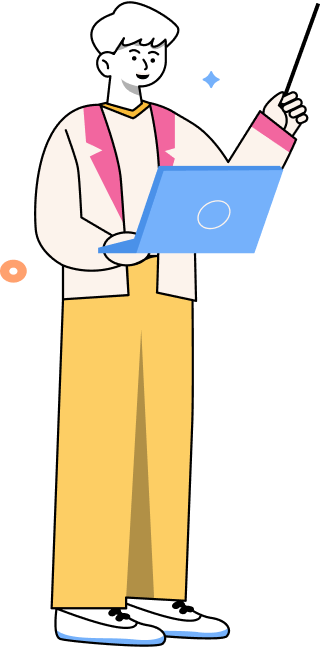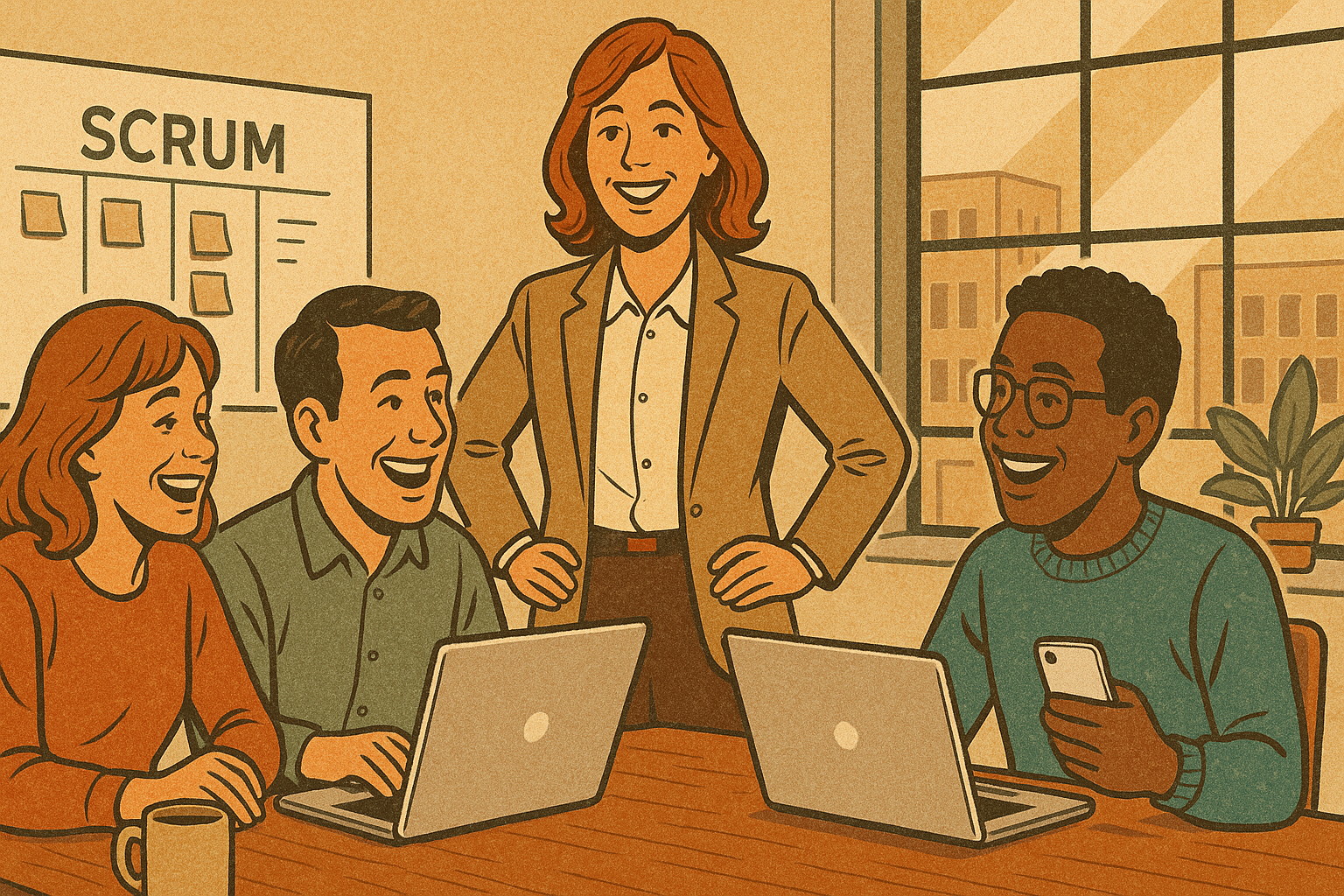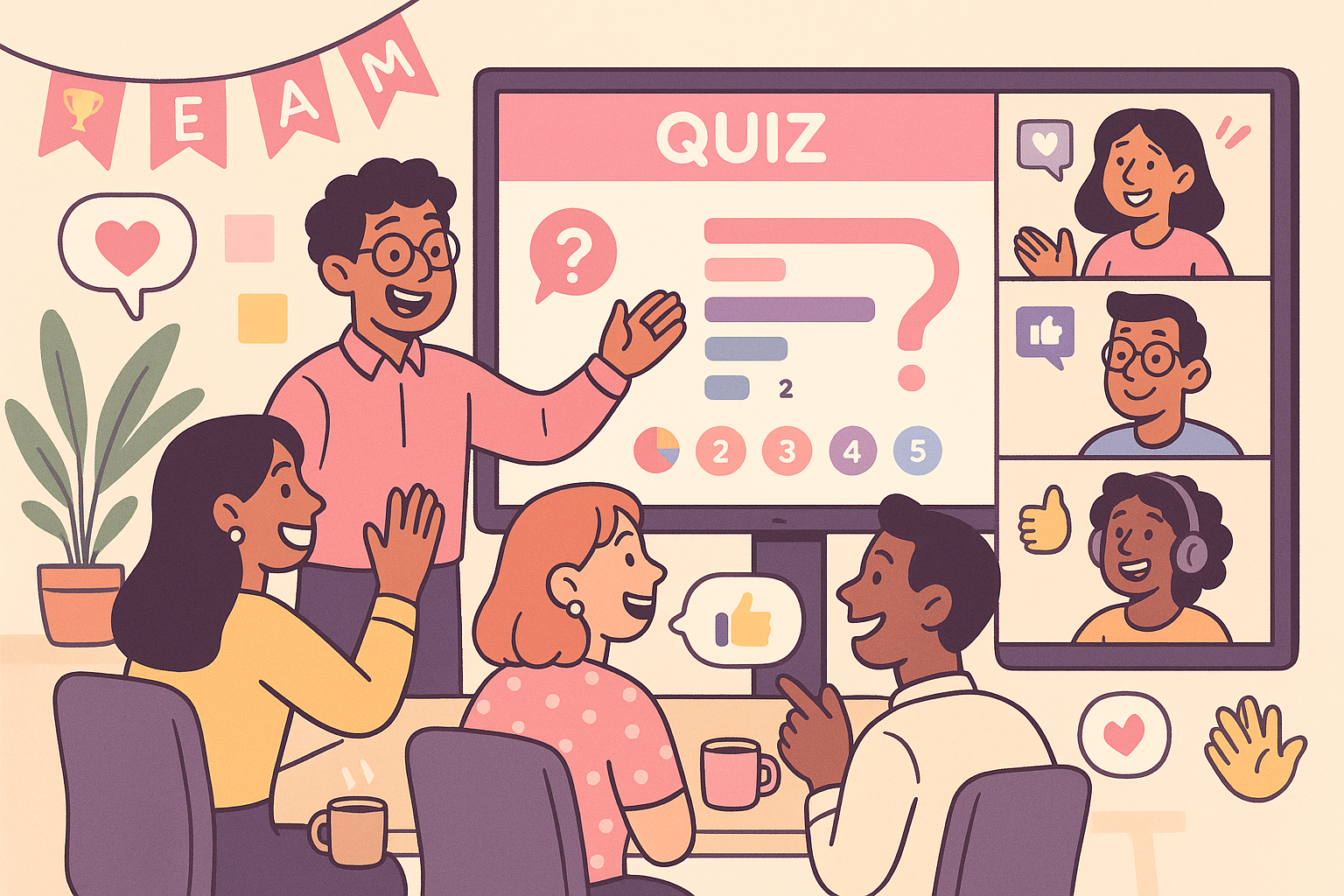16 Great Training Games for Employees and Teams
Training games keep trainees engaged and makes them learn faster. Here we analyze 16 of the best training games for your team.

Training can be tough. Whether you’ve got a group of new trainees, employees who need to be updated, or a sales team that could use some more details — when you’ve got a lot of information to impart, you know you need tools and tricks. Breaking things up with games (or just using games to teach) is the best way to keep your group engaged, learning your material, and happy.
We’ve scoured the internet and talked to expert trainers to find the best training games for your classroom, workshops, trainings, HR, and more. Here are our favorite options!
"There Will be a Quiz"
Quizzes are a fun and interactive way to test your employees' understanding after a training session. They provide immediate feedback on what has been absorbed and what areas might need further review.
Creating a quiz with Slides With Friends is as easy as picking one of our pre-made decks, adding question cards, and giving each card a timer and a score. You can do all of this — and more — in a few clicks from our editor, including editing how each card looks.

You Teach Me
Each member of your team has their unique perspective and expertise on a topic. “You teach me” promotes sharing this knowledge.
Here’s how it looks: Divide the attendees into small groups give each a set of training materials. For instance, in a sales training workshop, one group might receive information on negotiation techniques, another on product knowledge, and another on customer engagement strategies. Then, the groups will delve into the material and create a presentation based on it.
Do a Collaborative Case Study
Doing case studies give your team a way to see how what they’re learning applies to real-world situations. Start by conducting a regular training session. Then, divide your attendees intro groups. Make each group craft a presentation where they demonstrate how they would use what they just learned to handle the scenario.
After presenting, use a Q&A slide deck to review and discuss the case studies, encouraging further engagement and understanding of the material in a practical context.
Slides With Friends gives your team an intuitive tool to collaborate on presentations. That way, they can focus on using the training material rather than wrestling with complicated software.
Play Workplace Trivia
Want to make your training sessions more fun and effective? Try workplace trivia. These games test your your trainees’ knowledge of your company or industry. They also work as fun team building experiences with less serious topics.
Slides With Friends comes with many pre-made trivia decks. Editing a slide takes a couple of clicks at most, so you can adapt our decks to fit any topic you wish. With our powerful slide editor, you can create a workplace trivia event that will make your trainees feel like they are on a game show, rather than a soulless corporate training session.
Do a team scavenger hunt
Team scavenger hunts are an excellent way to create connection and improve team communication — even when done virtually.
The goal of a team scavenger hunt is to find as many items, complete as many tasks, or solve as many puzzles as possible within a time limit. The team with the most points at the end of the hunt wins.
And Slides With Friends comes with a deck already built for the occasion:
But you can also make the hunt more work-oriented by including challenges that relate to your company.

For example, you can ask your team to:
- Find an item that represents your company’s values or mission
- Record a video of themselves explaining a concept or skill that they learned in the training session
- Find a news article or a blog post that is relevant to your industry or field
- Solve a problem or a case study that is related to your work
Virtual Icebreakers
Just hired a new person? Reorganized your teams? Collaboration is key to success, but it can be hard to build trust and rapport among people who don’t know each other well. That’s why icebreakers area great way to start your training sessions, meetings, or workshops.
You can create virtual icebreakers easily with Slides With Friends. Ask controversial questions like tea vs coffee, or delve deeper into your teams’ work lives by making them share their best (or worst!) work experiences. The goal is to make every participant relax and feel part of a team of humans, not of flawless automatons.
Show & Tell
Want people to share bits of their regular-life that connect with the training session? Try a game of Show & tell.
Show & Tell can be a great activity for a training session, as it allows the trainees to share their personal experiences and insights related to the topic:
- Choose a theme or a topic for the Show & Tell that is relevant to the training session
- Use Slides With Friends to create a Live Photo sharing deck
- Display and discuss each photo, giving each trainee a chance to talk about their picture
- Summarize the main points or lessons learned from the activity
Here’s a starter deck that works well for this game:
For example, if you are training on customer service skills, you can ask trainees to show something that represents a positive ora negative customer interaction they had or witnessed.
Poll Your Audience
Training is a fantastic way to brush up your team’s skills. But giving feedback as a trainee can feel awkward at times, because they may not feel confident or qualified to share their opinions or suggestions with the trainer or peers
Slides With Friends makes live polling easy and fun. Start with one of our live polling decks:
Edit the cards accordingly, and use the deck at the start/end of a training session. Our platform lets you see the results of your polls in real time, as charts, word clouds, or lists. Use this feedback to improve your future training sessions and make them more engaging and effective.
Bring Interactive Meetings to Life
Meetings where one person talks and the rest listen often feel like a slog. People check out mentally when they don’t feel engaged.
But it doesn’t have to be like that.
Use this deck as as tarting point to make an interactive meeting:
Here are some possible questions you could ask participants:
- What are some challenges or questions you have related to the topic?
- What are some best practices or tips you can share with others?
- What are some action steps or goals you will take away from this meeting?

Describe that
Describe that is a game that helps participants practice using the vocabulary and concepts related to the training topic in a clear and concise way. It stimulates the participants’ imagination and encourages them to think outside the box and use different media to convey their message.
Start with any of our pre-made Trivia decks, like this one:
Via the editor, include words or images related to your training session. Then, divide participants in teams, and ask each to describe their word or phrase to the rest of the audience. Have other teams guess what the word or phrase is, and give points to both the describing team and the guessing team. You can use the platform’s scoring feature to assign points to each team based on how well they describe and guess the word or phrase.
What’s in the Room
What’s in the room is a game where participants are shown a picture of a room or a scene and they have to identify as many objects as they can.
Suppose you are training a group of sales representatives for a cloud computing company. You want to improve their product knowledge and customer service skills. Start with a trivia deck and create a presentation with pictures:
Each picture should have various devices and software applications that your company offers or competes with. You can then share the presentation with the trainees and ask them to identify as many devices and applications as they can in each picture. Have participants write down the name, price, and benefits of each product, as well as how they would address common customer objections or questions.
After each picture, you can reveal the correct answers and give feedback on their responses. You can also award points for each correct answer and keep track of the scores on a leaderboard.
Hear Me Out
Hear Me Out is a game designed to improve listening and communication skills, as well as to build trust and rapport among team members. Here are the rules:
- One person speaks for a certain amount of time on a given topic, while the others listen attentively
- After the speaker finishes, the listeners take turns to summarize what they heard and ask one follow-up question to the speaker. The speaker can then confirm or correct the summaries and answer the questions
To host a Hear me out game with Slides With Friends, create a new deck and add “Pass the mic” slides.

What’s My Line?
What’s My Line is a game that helps participants practice public speaking and thinking on their feet. Plus, it challenges them to use the slide deck as a guide, not as a crutch, and to make up the content of the presentation on the spot, withoutr evealing the topic.
Here’s how it works: The presenter creates a slide deck (start with any deck you like) with a title and bullet points. But the catch is that the title and bullet points are completely unrelated to the actual topic. For example, the title could be “How to Train Your Dragon”, but the topic could be “The Benefits of Meditation”. The listeners have to pay attention to the presenter’s speech and try to guess the topic.
This is a more general training game to improve communication, but it can work in more specific settings.
Word Association
Word association is a technique that can help improve training outcomes by activating prior knowledge, generating ideas, and exploring associations.
Simply create a new Slides With Friends deck and add a “Word cloud” card. When it comes up during the session, participants can type in their answer and submit it. The software will then automatically generate the word cloud with the answers.

You can use the word cloud to facilitate discussion, reflection, and feedback. You can also use word association as a pre- or post-assessment tool to measure the learning outcomes of your training.
Acronym Challenge
Acronym challenges are games that can help you review concepts, reinforce terminology, and check understanding related to your training topic.
Here is how you can use acronym challenges in your training sessions:
- Choose a few acronyms related to your training topic. For example, if your topic is accounting, you could choose acronyms like GAAP, FIFO, LIFO, EBITDA, etc.
- Create word cloud cards with the acronyms in your Slides With Friends deck
- Ask your team members to join the game on their devices and type what the acronyms stand for
You can set a time limit or a number of responses for each acronym. Display the word cloud on the screen and see what your team members typed. You can then discuss the correct and incorrect answers, and provide feedback and clarification.
Escape the Room
Escape the room is a game that helps participants to practice problem-solving, critical thinking, and teamwork skills. Plus, it challenges the participants to use their creativity and logic to escape from a virtual room or situation.
Here’s how it works: The presenter creates a slide deck with a theme, a story, a timer, and a series of challenges. The challenges can be puzzles, riddles, clues, or tasks that require the participants to use their knowledge, skills, or resources.
Check out this deck to see how you could set it up:
For example, the theme could be “Zombie Apocalypse”, the story could be “You are trapped in a bunker with a horde of zombies outside. You have to find a way out before they break in”, and the challenges could be “Find the code to unlock the door”, “Solve the crossword puzzle to reveal the location of the key”, or “Scan the QR code to access the map”.
The presenter shows the slide deck to the participants and starts the timer. The participants have to work together to solve the challenges and escape the room before the time runs out. The presenter can provide hints or feedback along the way. The participants can interact with the slide deck by typing in their answers, scanning QR codes, or sending pictures.
Improve Learning Outcomes with Fun Training Games
Make employees more engaged in their training sessions with the games in this article. Engaged trainees learn better and faster, and will participate in future trainings with more enthusiasm. Plus, you can expect them to perform better at their job thanks to their improved learning.


Ready to ditch the dull, and run team sessions that people will actually enjoy?
Get started with a Slides with Friends deck in no time. We’ve got all the interactive features you need in one easy-to-learn, easy-to-set-up tool.
